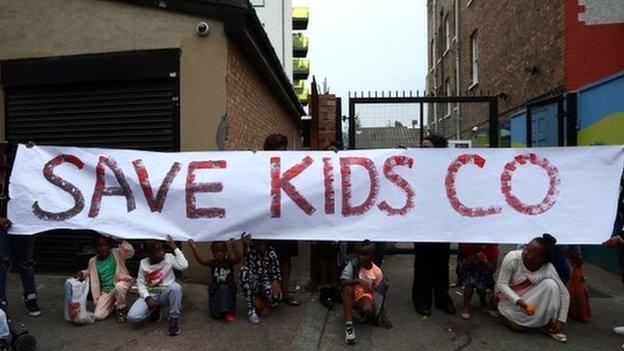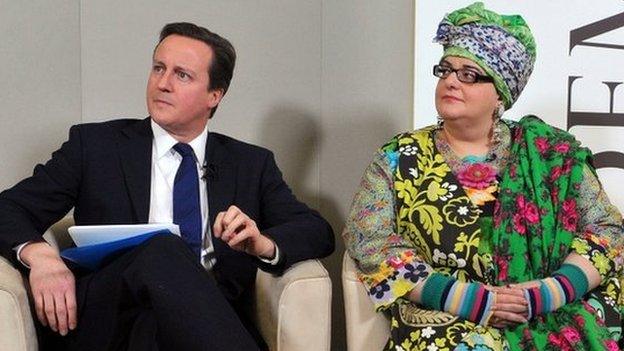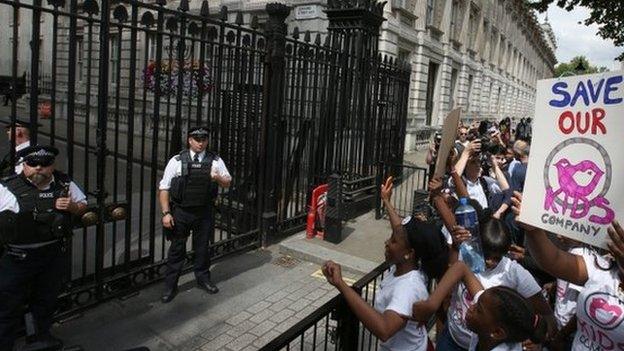How Kids Company 'bullied' ministers into funding them
- Published

The closure of Kids Company sparked protests at one of its centres
Kids Company won public funding for 13 years from government ministers despite grave reservations repeatedly being raised by civil servants, according to a new report into the now-closed charity by the National Audit Office.
Kids Company shut its doors in early August, just days after Matthew Hancock and Oliver Letwin, ministers at the Cabinet Office, told officials to pay it £3m.
This payment would always have been controversial: a senior civil servant had used a rarely-deployed formal process ("seeking a ministerial direction") to publicly note his reservations about plans to fund the charity.
The NAO, Parliament's spending watchdog, however, reveals that civil service worries were very longstanding.
The document will bolster concerns that the charity was, indeed, extremely poorly run: civil servants complained for more than a decade about its management under Camila Batmanghelidjh, its former chief executive, and Alan Yentob, the charity's chair of trustees from 2003 until it closed (he is also the BBC's creative director).
The fundamental question that the NAO sought to address is why, given concern about the charity for more than a decade, Kids Company was able to raise more than £40m from government departments.

The high-profile charity has regularly hosted leading politicians
The bully strategy
The document provides some evidence that the answer to this question is that the charity followed what Ms Batmanghelidjh referred to in an internal 2002 strategy document as a "bully strategy" to get money: threatening ministers "with the outcomes of failing to deliver care to children".
The NAO says that the charity "followed a consistent pattern of behaviour that we observed in 2002, 2005, 2007, 2010, 2012 and 2015, each time Kids Company approached the end of a grant term... Kids Company [would] lobby the government for a new funding commitment."
It continues: "If officials resisted, the charity would write to ministers expressing fears of redundancies and the impact of service closures.
"Around the same time, Kids Company would express the same concerns in the media.
"Ministers [would] ask officials to review options for funding Kids Company. Officials would award grants to Kids Company."
The document includes concerns noted by officials which recurred in part or in full throughout its life: officials told ministers in 2002 that Kids Company had been weakly managed, was not well regarded at a local level, that government funds would be put at risk if the charity failed, that a bail-out would set an unhelpful precedent and that there were other investments that could offer better value for money.
The NAO published a large table setting out which of these and other concerns were subsequently raised by officials in 2003, 2008, 2013 and 2015.
Meg Hillier, chair of the Commons Public Accounts Committee, said: "It is unbelievable that over 13 years taxpayers' money has been given to Kids Company with little focus on what it was actually achieving for the children it was supporting.
"Government repeatedly raised concerns about Kids Company's finances but little action was taken. Despite this, government gave it further grants - funded by the taxpayer."

Demonstration to save Kids Company on Whitehall
Questions for ministers and mandarins
And so, after a lot of analysis of the charity, the focus of the Kids Company saga now passes to Whitehall and Westminster.
As the charity's constant champions, ministers have something to fear. In mid-November, the Public Administration and Constitutional Affairs Committee (PACAC) expect to question Mr Hancock and Mr Letwin about their funding of Kids Company.
But the NAO report may provide them with a crumb of comfort. They will be able to point to other ministers who over-ruled civil service advice to bail Kids Company out.
They might argue that they were just the ministers who had the bad luck to be in post when it finally collapsed.
The NAO report confirms that the civil service was pressed into funding the charity by ministers, but the saga is awkward for them, too. They, too, expect a grilling from MPs.
On Monday, the Public Accounts Committee (PAC) will be taking testimony from Chris Wormald, permanent secretary at the Department for Education, and Richard Heaton, the official who, when permanent secretary of the Cabinet Office, publicly raised objections before approving funding for the charity.
But even Mr Heaton has something to worry about. The NAO report reveals he was also the accounting officer for the Cabinet Office when it sponsored £7.4m of previous grants.
The NAO also gazettes the various failed attempts by officials in the Department for Education and Cabinet Office to improve the charity's management.
For example, in 2013, the DfE "awarded a £200,000 contract to Methods Consulting Ltd (Methods) to monitor and evaluate the grant funding to Kids Company".
However, the "scope of its work did not include looking at the quality of the charity's services". They only counted the volume of it.
Assessed on this basis, the charity always met its targets - often by improbable margins: "Kids Company reported that against a target of 1,347 interventions in 2013-14, they delivered 30,217 interventions."
That occurred under Mr Wormald's watch. He needs to be able to explain how this was allowed to happen, especially as one concern that has emerged since Kids Company's closure is that it appears to have have a much smaller client-base than it had been claiming.
No-one's hands are clean here.
This document, at least, closes one chapter in this story: one investigation has ended.
The NAO's investigation into Kids Company is done. But the Public Accounts Committee, the Public Administration and Constitutional Affairs Committee, the Charity Commission, the London Borough of Southwark and the Metropolitan Police are still looking into the charity.